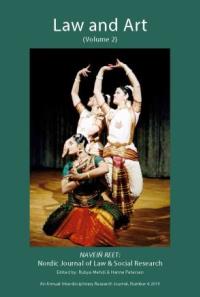Towards a Jurisprudence of the Embodied mind – Sarah Lund, Forbrydelsen and the Mindful Body
DOI:
https://doi.org/10.7146/nnjlsr.v0i6.111054Abstract
As Erika Fischer-Lichte remarked, the great Polish theatre theorist Jerzy Grotowski redefined the notion of the body of the actor as an embodied mind, as a responsive and responding self. Conversely, law abjures the body, its interpreters – lawyers and scholars – inured in practices of rationality, reason and logic, or mindful disembodiment. Travelling through the Danish capital, encountering Danes real and fictitious to illustrate how much we function through our bodies, this essay suggests that we are better and more effective legal interpreters as embodied minds, rather than disembodied minds. But this is not mindless embodiment, a mere reflex or bodily outburst. The embodied mind is self-aware (physically, socially, intellectually) and possesses the same embodied virtuous morality held by Grotowski’s actors. Reminiscent of Kierkegaard’s uniting of the mind-body divide, this connected mind and body challenges the Augustinian negation of the body and associated interpretative assumptions inherited over centuries of legal thought.
Downloads
Published
How to Cite
Issue
Section
License
Counting from number 12 (2022), articles published in NNJLSR are licensed under Attribution 4.0 International (CC BY 4.0). Readers are allowed to copy and redistribute the articles in any medium or format, to adapt and revise the articles, and use the articles for commercial purposes, provided that the readers give appropriate credits.
No Creative Commons licenses are applied on articles in number 1 (2009)-11 (2021). All rights reserved by the authors. Readers are allowed to download, read, and link to the articles published in volume 1 (2009)-11 (2021), but they may not republish or redistribute these articles without permission of the authors.

